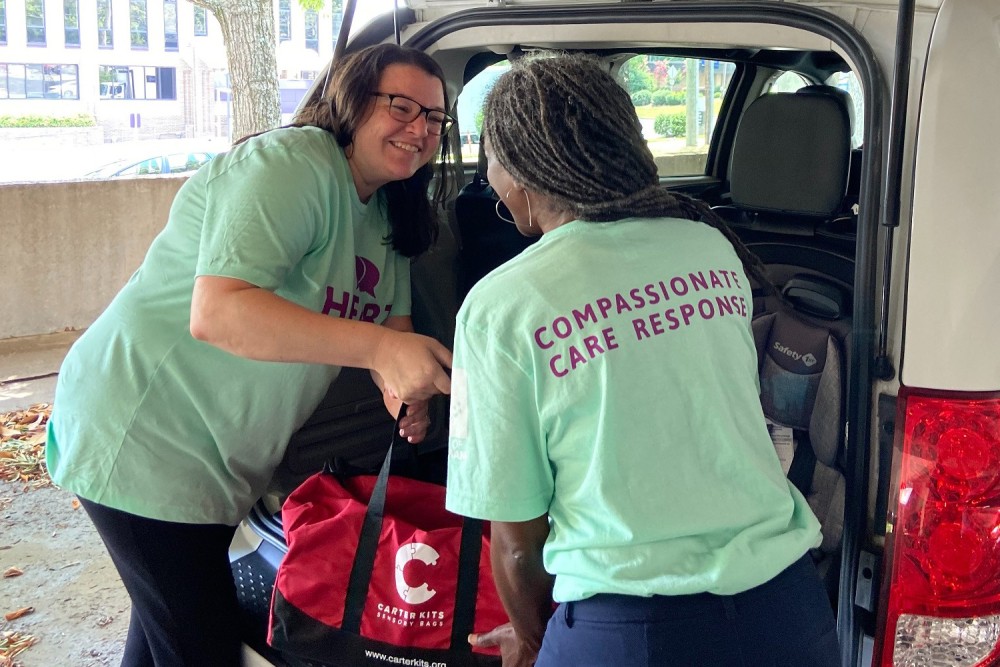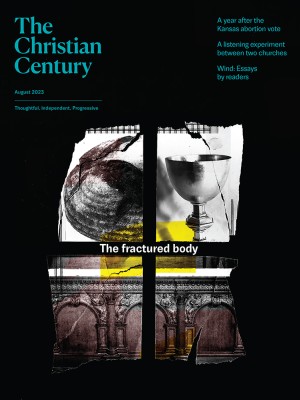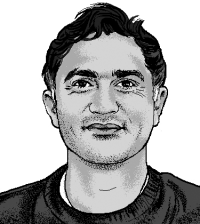Nonviolent crisis response in my city
I wish Durham’s HEART program had existed when my friend Joe was killed.

Members of Durham, North Carolina’s Holistic Empathetic Assistance Response Team, or HEART (Photo used with permission of the city of Durham)
When my mom drove my sister and me around town in our minivan, at the sound of ambulance sirens she would immediately lead us in a prayer for whoever was in distress. From behind the wheel, she’d start praying aloud, and we’d join along from the back seat. She’d pray for the healing of the person in need of help, for the wisdom of the first responders, for the skill of the medical professionals, for the alertness and safety of all the drivers on the road, for God’s care for everyone affected by the crisis.
Her words to God on behalf of people we didn’t know have formed my disposition toward emergency responders. Now, when I see or hear an ambulance, I can’t help but worry about the injured person, the people suffering some kind of trauma somewhere. My concern is a spiritual reflex, a result of my mom’s commitment to prayer. I can’t help but respect first responders as a fulfillment of prayer, their care as God’s care.
Read our latest issue or browse back issues.
Here in Durham, North Carolina, in June 2022, the city launched teams of unarmed first responders, which include mental health and social work professionals, as part of the new Community Safety Department. The Holistic Empathetic Assistance Response Teams program is tied into the 911 emergency system. Through HEART, mental health clinicians are available on the phone for people in crisis, and three-person response teams are dispatched for acute behavioral health situations.
This new municipal department organizes community-centered, nonviolent care for people in crisis. Its interventions provide compassionate care and de-escalate social disturbances—without the need for law enforcement personnel. These HEART teams respond to hundreds of calls each month, providing an alternative to policing and the criminal-legal system.
A movement of unarmed response teams is sweeping across the country—Denver, Los Angeles, Santa Fe, San Francisco, New York City. Eugene, Oregon, was the first city to implement this form of public service more than three decades ago (see “Who shows up when you call 911?” January 27, 2021). The HEART teams in our city resulted from the strategic advocacy and patient organizing of Durham Beyond Policing, a coalition of racial justice groups that first teamed up in 2016 to demand a shift of taxpayer funds from the police budget to community programs. Through years of activism and listening, of door knocking in overpoliced neighborhoods and developing relationships with elected representatives, DBP designed policy proposals for a peaceable city, for tending to our wholeness and wellness as a community. Teams of unarmed first responders are fundamental to that plan for a safer society.
Years ago, early in my pastoral ministry, I encountered the devastation of a law enforcement response in a situation where a team of clinicians would have prevented harm. My friend Joe was killed by a police officer while he was suffering a mental health crisis.
I first met Joe at a weekly lunch our church helped provide to people who lived in the woods behind a shopping center. He was just passing through, he said. But for some reason he stayed, living in a tent, wandering out every Wednesday to eat lunch and enjoy fellowship. Soon he started showing up early enough to set up the folding chairs and tables with us, to help prepare for the others. After a year or so in the woods, he asked us to help him find a rental. He had landed a job and could afford a place for himself.
The last time I saw Joe was at our annual shrimp jambalaya fundraiser for provisions for the community in the woods. A congregation in our network of partner organizations hosted the meal in its fellowship hall. Joe was the chef for the event; he loved to cook. After I ate my fill, he invited me back into the kitchen to show how he had transformed the cooking area with his restaurant-style prep stations. His eyes sparkled with pride in the work of his hands, with delight in making food for all of us.
A few weeks later, he had a psychological episode, a breakdown at his home. He called friends in a panic, in a delirium. He was experiencing suicidal ideation. One of his friends, trying to help, called 911. I drove over to his house as soon as I got a text about his condition. I arrived as the police were stringing up crime scene tape around the property. His body was lying on the ground, lifeless. I was told later that he had a kitchen knife in his hand when the officer shot him from a distance.
In the years since then, I’ve answered those late-night phone calls that pastors tend to get. Someone in crisis, in immediate danger, a threat to themselves: an overdose, an overwhelming compulsion for self-harm, a suicide attempt. I’ve called 911 for them to get them the care they need, to save their life. And every time, as soon as I’ve hung up the phone, the scene at Joe’s house has flashed through my mind. I’ve wished for an alternative, for emergency caregivers without guns.
“Seek the peace of the city where I have sent you into exile,” Jeremiah prophesies God’s word to the Israelites in Babylonian captivity, “and pray to the Lord on its behalf, for in its peace you will find your peace” (Jer. 29:7). This passage is a guide not only to care for our neighbors personally but also to work for collective peace, to engage in social peace. To care for the people in our communities, friends and strangers alike, involves shifting our governmental budgets toward domestic welfare: peace work as public works.







